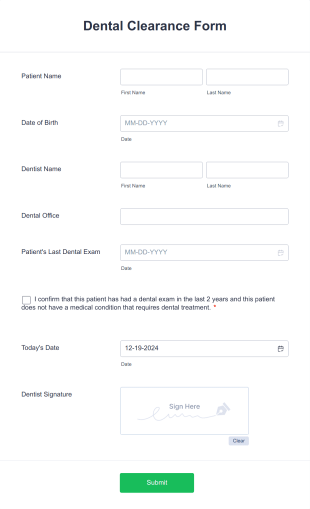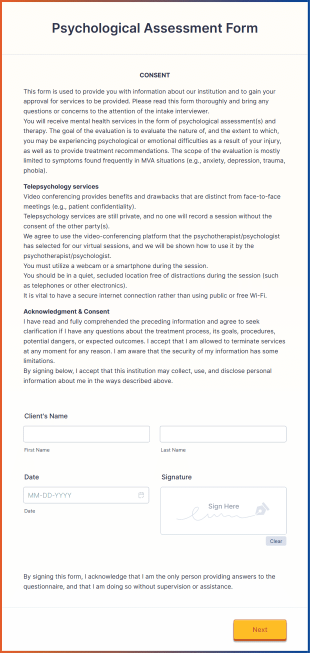A consent form is a signed document that outlines the informed consent of an individual for a medical study, clinical trial, or activity. Whether you’re looking for a way to gather model releases, activity waivers, parental consent, or medical consent forms, you can start by selecting one of our 400+ Consent Form Templates. Once you’ve chosen a consent form and customized its terms and conditions, all that’s left to do is embed the form on your website, send the link via email, or let participants fill out the form in person on your tablet or computer — you’ll then be able to securely collect consent forms online! You can even link your custom form to one of our Consent Agreement PDF Templates , to automatically turn form submissions into professional PDF documents.
Not sure where to start? No worries! Just choose a sample consent form from the list below and easily customize it using Jotform’s drag-and-drop Form Builder — no coding or design experience necessary! Outline the responsibilities of all parties involved, add a detailed release of liability, and include any other information necessary to provide indemnity and protect both your company and the individual giving their informed consent. Why not spice up your form by adding your logo and changing the background color too? Your consent form won’t just function well — it’ll look good too.
Make your consent form template even more efficient by adding Jotform’s powerful integrations. Connect with Google Sheets or Airtable to instantly generate a spreadsheet of all form submissions, or link your form to HubSpot, Zoho, or Salesforce (also available on Salesforce AppExchange) to automatically add participants to your CRM database. By gathering consent forms online with Jotform, you’ll eliminate messy paperwork, streamline your workflow, and save time that could be better spent elsewhere.
Other Consent Forms
1) What is a consent form?
Consent forms, also commonly referred to as release forms, are documents designed to inform participants on the details of an event, procedure, or activity. If participants choose to sign a consent form, they’re agreeing to the conditions specified and confirming that they understand the risks, benefits, and rules of their participation.
Health care providers commonly use these forms to ensure they’re compliant with HIPAA regulations and that they secure informed consent for medical procedures, clinical trials, studies, and other activities. HIPAA consent forms typically authorize the provider to send and receive protected patient health information. However, any document that secures approval and consent can be considered a consent or release form.
2) What are the different types of consent forms?
Consent forms vary depending on your industry, audience, and the services you provide. While there are hundreds of different types of specific consent forms, some common use cases include
- Informed consent forms
- Medical consent forms
- Travel consent forms
- Release forms
- Client contracts
- Liability waivers
- Parental consent forms
These consent forms are designed to fit the specific needs of your business or organization. Using a consent form template allows you to customize an existing form to match your branding and services.
3) What’s included in a consent form?
Consent forms vary depending on the circumstances they cover. For example, according to the Department of Health and Human Services Office of Human Research Protections, an informed consent form for medical research must contain the following information:
- Information on why you’re conducting research
- The length of time you’ll expect the individual to participate
- Expected procedures, especially those that are experimental
- Any risks or potential discomfort the participant might experience
- Any benefits the participant can reasonably expect to get from the research
- An explanation of any potential alternative methods or treatments
- A statement on the confidentiality of the information gathered
- Rules on compensation or recovery due to injury
- A list of contacts if participants have questions about the research or their rights or need to report an injury
- A statement on the voluntary nature of participation
While a more general consent form might not include all of these details, it should include a clear, detailed explanation of what the person is agreeing to, along with fields to indicate consent, such as date and signature fields or checkboxes.
4) How do you write a consent form?
Whether you build a consent form from scratch or use a consent form template, your form needs to be comprehensive and easy to understand.
Here are a few tips on how to write the best consent form possible:
- Use language that makes sense to your audience. Be conversational and direct, and avoid industry jargon.
- Write in the second person. Consent forms should directly address participants, using “you,” “your child,” etc.
- Minimize passive voice. Passive language leaves room for interpretation and misunderstanding. Clearly indicate which parties are responsible for specific actions.
Using these tips will keep your businesses protected and help your participants or customers feel more comfortable giving consent.
5) Who uses consent forms?
Consent forms are commonly associated with the healthcare industry. However, any business or organization that requires authorization for an activity can use consent forms.
For example, some other entities that use consent forms include
- Marketers
- Photographers
- Schools
- Event planners
- Tattoo artists
- Travel agencies
- Beauty salons
- Therapists
- Sports teams
Each of these entities may conduct services or activities that include some type of risk to participants, whether physical or financial, which is why it’s important to ensure participants understand the details of their involvement and indicate that they accept the risk.
Acquiring consent not only reassures your customers by giving them the information they need to make a decision, but it also protects your business from legal action. This makes consent forms an important asset for any business performing a service.
These templates are suggested forms only. Before using this or any form as a contract or other legal document, please consult with an attorney to make sure it meets the legal needs or your situation. Do not use this form to send a legal request to Jotform.





































